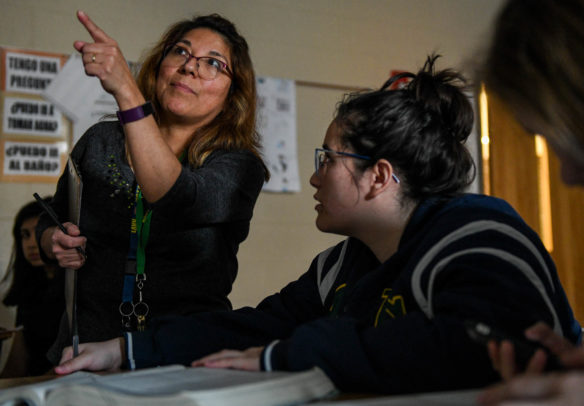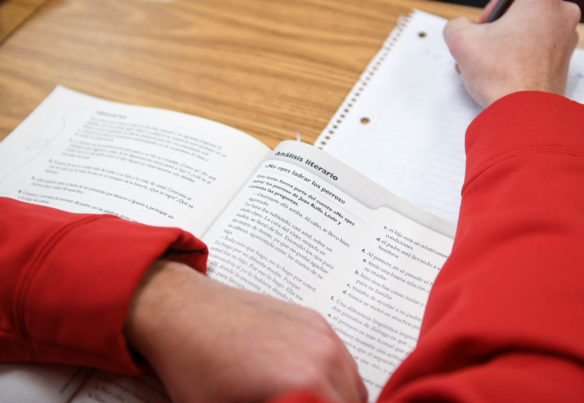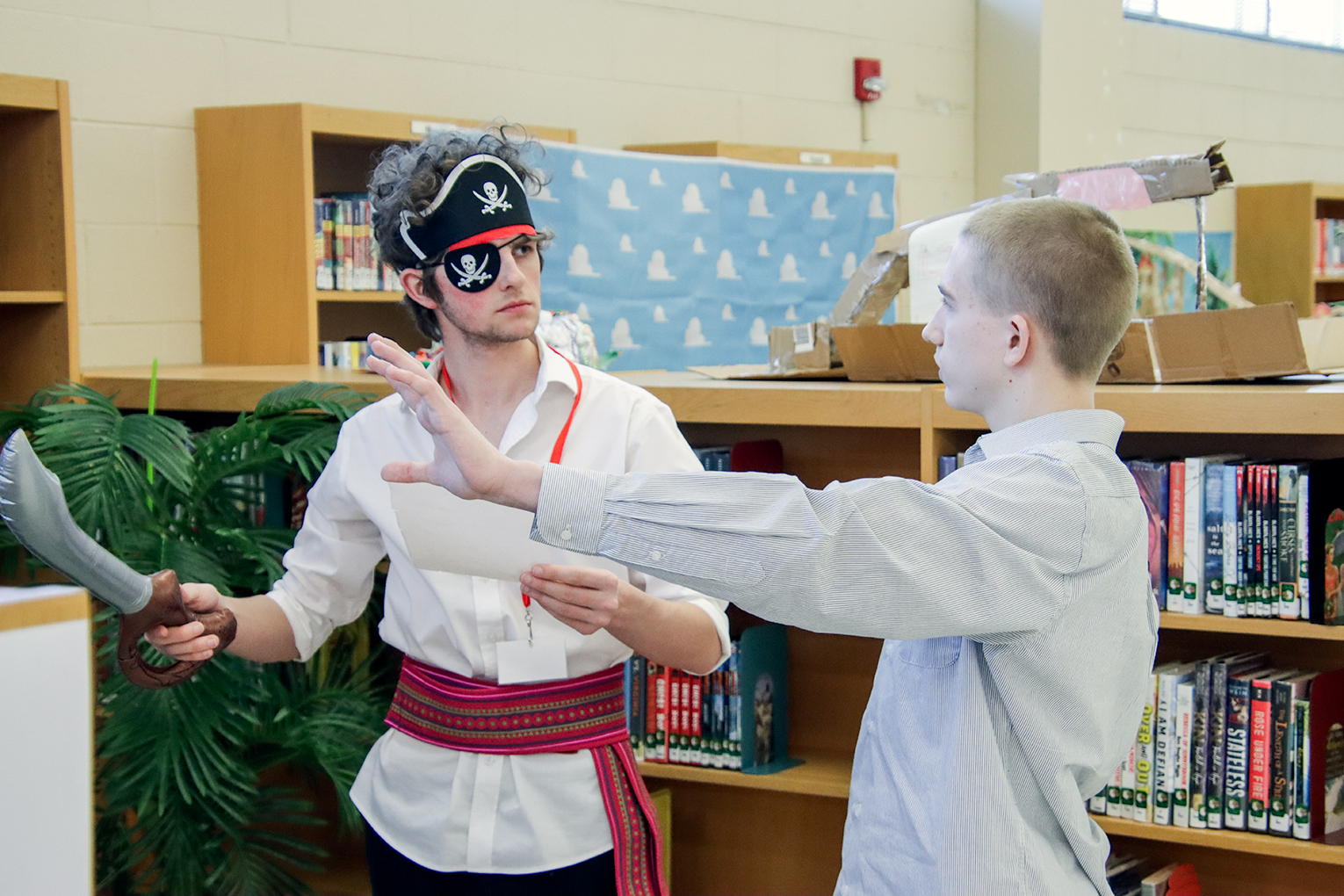
Laura DeVettori, left, a teacher in the Spanish immersion program at Bryan Station High School (Fayette County), talks with student Maria Vela about a piece of literature tied to the painting “Saturn Devouring His Son” in her Spanish immersion AP literature course. Students at Fayette County schools who become proficient in at least two languages are eligible to earn the Seal of Biliteracy from the district.
Photo by Bobby Ellis, Dec. 7, 2017
By Mike Marsee
mike.marsee@education.ky.gov
One of the most critical steps toward global competency is the ability to communicate effectively, and that can mean mastery of a second language.
Fayette County schools have begun placing a premium on being bilingual by becoming the first district in the state to award the Seal of Biliteracy. The seal, which is placed on a high school diploma, is given by a school, district or state in recognition of students who have studied and become proficient in at least two languages.
“In our mission statement, we say we want our students to be ready for a global society. You need to have that language component where you can speak English to a certain level, and knowing another language is so important these days,” said Laura Roché Youngworth, the world language specialist in the Fayette County schools.
The Seal of Biliteracy was developed in 2008 by Californians Together, a nonprofit organization dedicated to better understanding English learners (ELs). It has been approved for statewide use in 30 states and is either under consideration for statewide use or in use in parts of 13 other states, including Kentucky.
Fayette County is the only district in Kentucky to award the seal thus far. Fayette County awarded the seal to 66 students last year after starting the program midyear, and more students are expected to earn the seal this year.
“We were pretty pleased,” Youngworth said. “It’s something we intended to start this school year, but when we presented the idea to the board, they were excited about it and we started in January.”

Ashton Meuser, a 12th-grader at Bryan Station High School (Fayette County), reviews a workbook written in Spanish while studying for finals in Laura DeVettori’s Spanish immersion AP literature class. Cultural studies and world languages has been included as a measure of opportunity and access in Kentucky’s new accountability system.
Photo by Bobby Ellis, Dec. 7, 2017
Students receiving the Seal of Biliteracy must demonstrate proficiency in both English and a second world language. They can satisfy the English requirement by meeting language arts requirements for graduation and earning a minimum ACT or SAT score, and they can satisfy the world language requirement through proficiency testing.
Another initiative that launched last year in Jefferson County takes the idea a step further by incorporating biliteracy into a larger program.
The World Affairs Council (WAC) of Kentucky and Southern Indiana is offering the Global Citizenship Certificate Program, in which high school students prepare for global citizenship by completing a series of program requirements over two to four years. One of those requirements is biliteracy.
Jacque Van Houten, the world language specialist for Jefferson County schools who represents her district on the WAC’s education advisory committee, said she advocated to make language an integral part of the global citizenship program.
“I didn’t see a whole lot in the World Affairs Council’s program or in global competency in general that addressed language,” Van Houten said. “Students need to be investigators of the world in a broad sense, and they need to use language to help them do that.”
Alfonso De Torres Núñez, the world languages consultant at the Kentucky Department of Education, said he was pleased to see both programs start at the local level, and he expects more like them in other districts with the inclusion of cultural studies and world languages as a measure of opportunity and access in Kentucky’s new accountability system.
“It speaks volumes that this type of certification was included the accountability system,” De Torres Núñez said. “The students in these first cohorts could go right now to any company and demonstrate that they are able to speak a language at a proficiency level, which is not the average that you would get after two foreign language courses at the high school level.
“In global competency terms, they are learning how to investigate the world through that language. They are learning how to recognize perspectives and interaction between cultures. They are learning to recognize cultural practices and behaviors. They are learning how to communicate an idea in a language other than their own, and based on that, they are learning how to take informed action.”
De Torres Núñez noted that enrollment in world language programs in Kentucky schools has increased for three consecutive years, with more than 160,000 students learning a world language this school year.
Fayette County’s Youngworth said one of her district’s top priorities in establishing the Seal of Biliteracy was determining how students would be tested for proficiency. Students participating in the program are represented by eight different languages in addition to English. While many were measured with assessments from the American Council on the Teaching of Foreign Languages, there was no assessment available for some languages, such as Haitian Creole and Korean.
“We didn’t want to exclude them, so we had to make an assessment at the district level that could be converted into any language,” Youngworth said.
English was the first language for the majority of students in the first year of Fayette County’s Seal of Biliteracy program, but Youngworth said the district has worked to make sure English learners know the program is open to them as well. She said there were also a number of students who weren’t recognized as ELs, but who spoke another language at home.
“This gives value to the culture and the language they speak at home, but maybe never used at school. It showed that Fayette County valued that,” Youngworth said.
Jefferson County’s participation in the Global Citizenship Certificate Program began last year with a pilot program at Seneca High School.
“Last year we focused on getting the faculty on board and getting students interested, as well as knowing what type of test has be done for the language,” Van Houten said. “We’re going about it more strategically in the second year.”
The program is open to students in grades 9-11 throughout Kentucky and Southern Indiana. Van Houten said the World Affairs Council sent invitations to schools and teachers across the state this year, and while most of the 40 or so students who are participating are concentrated in Jefferson County, students in Breathitt, Daviess, Laurel, and Oldham counties and the Elizabethtown Independent district also are participating.
“All of them are self-reporting through an app. This is not something the teacher does, but we ask the teachers to be aware of it and give guidance. We request that students attend four international lectures, participate in a competition and an international festival, complete certain courses, and demonstrate language proficiency. We also ask them to submit several reflection pieces.” she said.
“There is community interaction and some service, and the capstone project is the last thing. They have to complete a project – it can be art, service, a paper or a presentation – that shows an understanding of global citizenship and how the local community is connected globally.”
Van Houten, who said the national WAC is tracking the success of the Kentucky and southern Indiana program for possible adaptation nationwide, said the goal is to develop students with greater global perspectives.
“We’re hoping that they become informed citizens and that they develop a curiosity through this work for learning and for world affairs,” she said.
Van Houten said officials with the World Affairs Council hope ELs become a significant part of their program.
“They already come with a lot of global awareness, but their language is often looked at as a detriment, while it should be viewed as a benefit,” she said.
De Torres Núñez said students who earn either the Seal of Biliteracy or the Global Citizenship Certificate may help drive economic development in their communities.
“The more these companies see graduates with these skills – not just welding skills or engineering skills, but these types of soft skills, the knowledge of language culture, and also global competency – the more likely they are to stay in the area,” De Torres Núñez said. “The schools would continue feeding companies not just the basic workforce, but a more specialized workforce ready to communicate and interact with the world that will make them better able to compete with other businesses in their area.”
Youngworth said she wants Fayette County graduates who earn the Seal of Biliteracy to help fill the growing need for students who speak languages other than English in Kentucky’s workforce.
“We’re going to tell employers, ‘Look for graduates who have this, because they’ll bring these job skills to your business,’” she said.
MORE INFO …
Jacque Van Houten jacque.vanhouten@jefferson.kyschools.us
Laura Roché Youngworth laura.roche@fayette.kyschools.us
Alfonso De Torres Núñez alfonso.detorres.nunez@education.ky.gov




[…] http://www.kentuckyteacher.org/features/2018/01/the-benefits-of-biliteracy/ […]